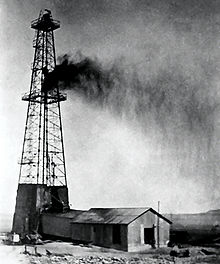Dammam No. 7
26°19′15.95″N 50°7′39.94″E / 26.3210972°N 50.1277611°E
| Dammam No. 7 | |
|---|---|
 | |
| Country | Saudi Arabia |
| Region | Eastern Province |
| Location | Dhahran (Dammam metropolitan area) |
| Coordinates | 26°19′15.95″N 50°7′39.94″E / 26.3210972°N 50.1277611°E[1] |
| Operator | Saudi Aramco |
| Field history | |
| Discovery | 1938 |
| Start of development | 1946 |
| Start of production | 1949 |
| Abandonment | 1982 |
| Production | |
| Peak of production (oil) | 1,600 barrels per day (~100,000 t/a) |
Dammam No. 7 is the oil well where commercial quantities of oil were first discovered in Saudi Arabia in 1938.
Background
[edit]When drilling commenced in the 1930s, there was uncertainty as to whether oil even existed in the kingdom.[2] However, Saudi Arabia was motivated to search for oil after learning about the discovery of oil by neighboring country Bahrain in 1932.[3] After failing to find significant quantities of oil in the first six wells (Dammam No. 1–6),[4] Saudi Aramco (then known as the California Arabian Standard Oil Company or CASOC) ordered a halt to all oil drilling in the Kingdom except at No. 7 in November 1937; by this time, the well was already twice as deep as the "Bahrain Zone", the depth at which oil was first discovered in Bahrain.[5]
Oil discovery
[edit]In a project led by American geologist Max Steineke and assisted by Saudi Bedouin Khamis Bin Rimthan, the two men persisted to drill deeper in the well.[6] On March 4, 1938, commercial volumes of oil began gushing out of the well at a depth of approximately 1,440 m (4,720 ft).[7][8] On that day, 1,585 barrels of oil were extracted from the well, and six days later this daily output had increased to 3,810 barrels.[9]
Production volume
[edit]From 1938 until its closure in 1982, the well produced more than 32 million barrels of oil with a daily average of 1,600 barrels.[10]
Legacy and cultural impact
[edit]Crown Prince Abdullah officially named Dammam No. 7 the 'Prosperity Well' in 1999.[5] In 2021, Saudi Aramco built a supercomputer called Dammam 7,[11] named after the well; it is ranked the tenth-most powerful supercomputer in the world.[12] In August 2023, it was announced that an upcoming film titled Sands of Fortune would feature the story of Dammam No. 7 while chronicling the early history of the Saudi oil industry.[13][14] In the present day, the oil well still stands and is integrated into an Aramco museum, where visitors frequently have their photographs taken in front of the historic landmark.[15]
See also
[edit]Further reading
[edit]- "Well No. 7 Leaflet in English" published by King Saud University
- Stegner, Wallace; Thompson, Don (January–February 1969). "Discovery! The Story Of Aramco Then — Chapter 7: Dammam No. 7". Aramco World. Vol. 20, no. 1. Saudi Aramco. pp. 12–21. Retrieved October 27, 2023.
References
[edit]- ^ "Oil Well 7" (Map). Google Maps. Retrieved 30 November 2023.
- ^ Martin, Will (December 11, 2019). "From an unexplored desert to a near $2 trillion IPO: The 86-year history of Saudi Aramco in pictures". Business Insider. Retrieved October 21, 2023.
- ^ Wilson, Augustus O. (2020). The Middle and Late Jurassic Intrashelf Basin of the Eastern Arabian Peninsula. Geological Society. p. 14. ISBN 9781786205261.
- ^ Zhang, Li; Cook, Kristin Weyand; Haider, Batool Arhamna (September 19, 2015). "Lucky No.7: A Tale of Oil in the Saudi Arabian Desert". jpt.spe.org. Society of Petroleum Engineers. Retrieved October 21, 2023.
- ^ a b Danforth, Loring M. (March 29, 2016). "(One) Can Oil Bring Happiness?". Crossing the Kingdom — Portraits of Saudi Arabia. Oakland, California: University of California Press. p. 32. ISBN 9780520290280.
- ^ "How a Bedouin helped discover first Saudi oil well 80 years ago". saudigazette.com. Saudi Gazette. March 8, 2018. Retrieved October 21, 2023.
- ^ Kingston, A.J. (2023). "Chapter 1: The Black Gold Rush: Saudi Arabia's Oil Revolution (Early 1900s)". House of Saud: Saudi Arabia's Royal Dynasty. Vol. Book 2: Oil, Power and Influence — House of Saud in the 20th Century (1900s–2000s). A.J. Kingston. ISBN 9781839384820.
- ^ Mababaya, Mamarinta P. (2002). The Role of Multinational Companies in the Middle East — The Case of Saudi Arabia. University of Westminster Press. p. 359. ISBN 9781581121728.
- ^ Kotilaine, Jarmo T. (August 16, 2023). Sustainable Prosperity in the Arab Gulf — From Miracle to Method. Taylor & Francis. ISBN 9781000921762.
- ^ Al-Sughair, Sultan (August 1, 2015). "Well No.7 that established KSA on world oil map". arabnews.com. Arab News. Retrieved September 20, 2023.
- ^ Argaam (January 19, 2021). "Saudi Aramco, stc launch Dammam 7 supercomputer". Arab News. Retrieved October 21, 2023.
- ^ Peckham, Oliver (January 21, 2021). "Saudi Aramco Unveils Dammam 7, Its New Top Ten Supercomputer". hpcwire.com. HPCwire. Retrieved September 20, 2023.
- ^ Goodfellow, Melanie (August 22, 2023). "Passage Pictures Announces 'Sands Of Fortune' Chronicling Discovery Of Oil In Saudi Arabia & Early Days Of Aramco". Deadline Hollywood. Retrieved September 25, 2023.
- ^ "Hollywood movie to feature true story of Saudi oil giant". middleeastmonitor.com. Middle East Monitor. August 29, 2023. Retrieved October 21, 2023.
- ^ Lippman, Thomas (November 10, 2008). Inside the Mirage: America's Fragile Partnership with Saudi Arabia. Basic Books. ISBN 9780786742530.
